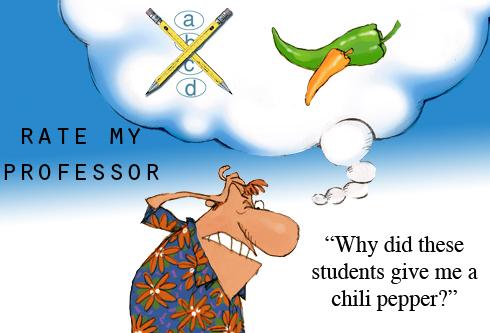Everyone remembers the first semester that they scheduled by themselves, the hours spent scanning over the course catalogue, the defeat as all of your dream classes filled up, and skipping your Thursday 8 a.m. so you could (hopefully) get a spot in the class with two seats left. Spoiler alert, you never did.
When all was said and done, what you probably did was ask around for easy liberal studies to take in place of eternally sought after core classes. If you were anything like us, you chose between two classes in favor of which professor got a higher rating on Rate My Professor.
While RMP is an easy way to get an overview of professors and how easy their classes are, it’s important that you also take the extremely good or bad reviews with a grain of salt. It will be pretty easy to figure out which students are actively pursuing a vendetta against their professors, (note the red frowny-face, and the one line comment that says “he/she sucks,” but doesn’t explain why they didn’t like the professor.) You should also be wary of the reviews that swing in the opposite direction (no class is all rainbows and smiles.)
The best reviews are usually the ones that have a rating that goes into both the pros and cons of not only the professor, but also the nature of the class. Careful reviewers that take both pros and cons of courses into account are usually pretty reputable, and if you check back to those reviews on your professor after you’ve completed the course, you’ll usually find that you agree with their review.
While RMP does have thoughtful reviewers who take their time when writing their reviews, there usually aren’t many of them, if there are any at all. In that case, key words can go a long way. If you’re a tactical learner, avoid professors that people say “only uses powerpoint.” If you often have trouble sitting in class for long periods of time, don’t pick a professor that is consistently reported as being boring. What works for one student will not work for another, and it’s important to take that into account when picking classes as well.
That being said, your friends will usually have a better idea of what classes will suit you, and will have the most solid opinions since they can answer any questions you have about the class that reviewers on RMP can’t always answer. Plus, you can always borrow their book and save yourself a few hundred dollars (which is always a plus.) Ask around to see which classes are best suited to you and your needs and interests; but remember classes that other students found easy may prove to be difficult for you, and vice versa.
Even if a class doesn’t count toward your liberal studies, but seems interesting, take it anyway. If you’re an exercise science major who likes to write fiction, then take a creative writing class. Maybe you’re an education major who’s always been interested in religious philosophy, take world religions. Even if a class is widely regarded by others as “difficult,” your own interest in the material will make up for the difficulty. It’s always better to take an interesting class that you’ll learn from over an easy course that doesn’t teach you anything.
When in doubt, you could always email a professor to ask about the content of the course, and its difficulty level. They could even lead you to other classes that you might be interested in taking.
Scheduling is a pain, no matter if you’re a freshman or a senior. Sometimes you’re not going to get the professors or classes you want, but be smart about substitution classes that you’ll be taking instead. A professor can either make or break your semester.







